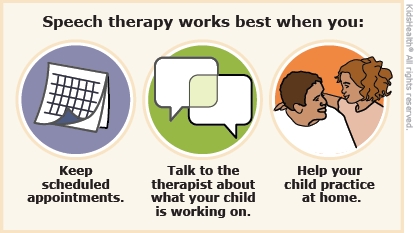Speech Therapy: What to Expect
Speech therapy helps kids who have trouble with speech or language, or using their mouth and tongue muscles. It's important for kids to practice what they learn in speech therapy at home.


Speech therapy is a treatment for kids who have speech problems, like stuttering or trouble saying certain sounds. It is also for kids who need help understanding or using language; have hearing loss; or have trouble sucking, chewing, or swallowing.
At the first visit, the speech therapist (also called a speech-language pathologist) will learn more about your child's problem so that a plan can be made. Depending on your child's age and type of problem, the speech therapist might:
-
ask questions about your pregnancy, your child's birth, health, development, speech, behavior, and school performance
-
ask your child questions and listen carefully to the answers, and listen to different parts of your child's words
-
watch your child eat or do tests that check your child's swallowing
-
want to know about any services received at your child's school. Bring a copy of the Individualized Education Program (IEP) and/or 504 plan if your child has one.
All of this information will help the speech therapist understand which treatment is best for your child.
Treatment usually includes regular appointments with the speech therapist and activities to do at home or in child care or school. The speech therapist might work with your child one-on-one or in a small group. Sometimes the therapist may recommend that other types of services be given at school.
Speech therapists do different things depending on a child's age and needs. These can include:
-
playing and talking in a way that helps kids improve their language skills
-
showing a child how to move the lips and tongue to make different sounds
-
having a child practice certain words or sounds
-
teaching a child exercises for the tongue, lip, and jaw to strengthen the muscles of the mouth
-
having a child try foods with different textures (such as smooth or chunky) and temperatures
-
teaching a child ways to make chewing and swallowing food easier
-
helping kids with hearing loss improve their speech and, if possible, listening skills
Parents and family members are an important part of a child's treatment. The speech therapist might ask you to come to appointments and stay with your child. This will make it easier for you to help your child practice new skills at home. Kids learn faster and have longer-lasting results when parents are involved.
